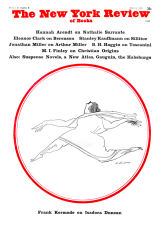In response to:
Mythmanship from the February 6, 1964 issue
To the Editors:
I want to commend G.S. Fraser for the intelligent position he takes on his review of Northrop Frye’s Fables of Identity. In his discussion of Hamlet’s assertion, “This is I, Hamlet the Dane!” however, he may be missing a matter of idiom that must be considered. The phrase “the Dane” means first, simply, “king of the Danes.” Thus, Claudius in I, ii. says to Laertes: “You cannot speak of reason to the Dane/And lose your voice.” The only primitive element in this urbane invitation is the primitive that underlies any confident assertion of identity. The irony of Claudius as an urbane “berserker” may be picked up by the reader or teacher, but it ought to be handled very carefully before being dropped again. Hamlet finally declares himself king. The primitive identity he lost and found was inseparable from that office or role. The best grasp of Hamlet’s experience still begins with the fact that his father was a king and he had to be one, too.
This reminds me of another example of sophisticated ignorance of Shakespeare’s idiom. In The New Yorker for January 25 (p. 22) we are presented with the mysterious East at work: a sign on tiger cages in the New Delhi Zoo that reads, “Dangerous Animals/ keep Aloof.” This is amusing, but the source of the error is more so. The Indian who wrote that sign probably learned much of his English by reading Shakespeare. In Shakespeare’s language the term “aloof” often means simply “at a physical distance.” For example, Portia says, when Bassanio is about to pass the casket test, “Nerissa and the rest, stand all aloof.” (Merchant, III. ii. 42).
A sense of the primitive and the odd in Shakespeare, as in modern novels, can be won only through a knowledge of idiom. I hope you will print all of this letter, because in this year of anniversary spectaculars the smart reader ought to be encouraged to go back to his school text and read the notes.
Richard Harrier
New York University
G. S Fraser replies:
I thank Mr. Harrier for his kind words, and for bringing up a point I had not thought of. Two objections occur to me. (1) Denmark was, in Shakespeare’s time and earlier, an elective monarchy. The King had to be of the blood royal but need not be the eldest son of the deceased King. Claudius was elected quite constitutionally and does, in fact, in diplomacy, in confronting Laertes, in everything but his dealings with Hamlet—how sensible it would have been to let Hamlet go back to Wittenberg, instead of letting a disgruntled possible successor hang about the Court!—show himself a thoroughly capable and public-spirited ruler. If I had been on the Council, I think I would have voted for Claudius rather than Hamlet. So perhaps Hamlet was not “the Dane,” when he made this speech, in the sense of the legitimate King of Denmark replaced by an usurper. Only two phrases of Hamlet’s, “Popped in between the election and my throne,” and “I lack advancement,” suggest that anger at not being King was an important reason for his wishing, or thinking he wished, to kill Claudius. (2) Was “King of Denmark” the only possible meaning, in Elizabethan English, of “the Dane”? Could the phrase never mean “that famous Dane”? I am thinking of Ogier the Dane in the Charlemagne cycle, who was of the Danish blood royal, but is perhaps called “the Dane” chiefly because he is a Danish warrior fighting alongside Franks. Mr. Harrier’s scholarly comment does not seem to me to explain why this phrase, “This is I, Hamlet the Dane!” produces the peculiar frisson which Frye and Rosenberg are right in seeing it produces.
This Issue
March 5, 1964



